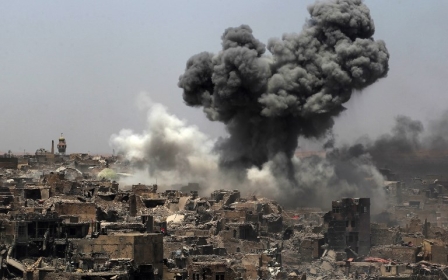Destitution and despair as 100,000 flee Assad onslaught on Idlib

Syrians in Idlib say they have been abandoned by the world, as tens of thousands flee a government onslaught that has destroyed entire villages and left their people in "despair".
Troops loyal to President Bashar al-Assad pounded the province with artillery on Monday as forces advanced north, while at least 100,000 Syrian have reportedly fled towards the Turkish border in the past week, according to Turkish aid groups.
The province, which along with the Damascus suburb of Eastern Ghouta, remains one of only two major opposition strongholds in Syria and is controlled by Hayat Tahrir al-Sham (HTS), a coalition dominated by the former al-Qaeda affiliates Jabhat Fateh al-Sham (JFS).
"There is despair," said Ahmed, a 21-year-old student at Idlib University, speaking to Middle East Eye. "They know that they will have to leave at any time unannounced."
"The residents of two villages, Alghadfa and Jarjanaz, have left their homes because it was completely destroyed by the shelling."
'People have given up on the world helping them and doing everything they can to survive'
- Ahmed, Idlib resident
Ahmed said families had begun makeshift camps on the sides of roads, and were burning whatever they could find to stay warm in the winter months.
"These people have no aid, no one to help them," he said.
"People have given up on the world helping them and doing everything they can to survive."
Hosam Mohammed, a doctor in city of Harem, said his hospital had seen an increase in the number of patients in the last two weeks as government air strikes intensified, and that there was now a severe shortage of medical supplies.
"We haven't the capabilities to take care of many patients so we send many critically injured people to Bab al-Hawa border hospital, and from there they are being taken care of or sent to hospitals inside Turkey to do more complex operations," he explained.
He warned that the cold weather and lack of shelter and clean water was exacerbating the situation.
"Living in the mountains in a muddy land with no services at all will lead to making the life of those people more challenging during winter," he warned.
Syrian army forces, backed up by volunteer militias, are currently aiming to take the Abu Duhour military air base in eastern Aleppo. Following this, heading north they will link up with pro-Assad forces in southern Aleppo, effectively separating east and west Idlib into two different entities.
Through a campaign of violence supported by Russian jets, as well as Iranian, Iraqi, Lebanese and Afghan militias, the Syrian government has managed to recapture the majority of Syria, even after Assad looked to be in a shaky position in early 2015.
More than 340,000 people have been killed and millions have been driven from their homes since the conflict erupted with anti-government protests in 2011.
On Tuesday, Turkey's foreign minister accused the Syrian government of striking "moderate" forces in the province and warned that any continuation of hostilities could threaten peace talks set to be held in the Russian resort of Sochi on 29 January.
"Regime forces are striking moderate opposition with the pretext of fighting against al-Nusra (Front)," Mevlut Cavusoglu said, referring to the former name of JFS.
"This attitude would scupper the political solution process."
Last year, Russia, Turkey and Iran negotiated the creation of "de-escalation zones" in a number of areas in Syria, aimed at halting fighting.
However, the Syrian government and its allies have repeatedly ignored this and continued to attack rebel-held areas.
But in a move to show its impatience with the situation, Turkey summoned on Tuesday the ambassadors of Russia and Iran to protest the Assad government's violations of de-escalation zone borders in Syria's Idlib in recent days, the Turkish foreign ministry said.
Rebel disunity
Many residents of Idlib have also blamed disunity among the rebel factions, both inside and outside the province, for the Syrian government's advance.
Idlib was originally captured in 2015 by the Jaish al-Fateh (Army of Conquest) coalition, which included then al-Nusra Front, Ahrar al-Sham, Faylaq al-Sham and a number of other rebel factions.
However, the alliance ran into difficulties after tensions emerged between the different groups, particularly over the ideological differences between al-Nusra Front (then openly aligned with al-Qaeda) and the other groups.
Following a series of clashes in 2017, the rebranded HTS were able to seize full control of the province, even driving out the once-powerful Ahrar al-Sham.
The move alarmed the international community, who largely consider HTS a terrorist organisation, as well as Idlib residents who have faced severe repression by the group, as well as the overruling of locally elected bodies.
Some suspect that the blast, which activists said was the result of a car bomb, may have been arranged by a rival rebel group.
Mohammed Radwan, a volunteer aid worker who operates in Idlib, told MEE that locals had begun demonstrating, calling for rebel groups to unite in the face of pro-Assad forces.
"They are disturbed by the internal fighting because it weakens the strength of the revolutionary factions," he said.
"And the areas become easier to control by the Assad forces and their allies."
"So they took out demonstrations denouncing their fighting and calling them to unite the word and fight the Assad army only because it is the main enemy."
- Additional reporting by Zouhir Al Shimale
This article is available in French on Middle East Eye French edition.
Stay informed with MEE's newsletters
Sign up to get the latest alerts, insights and analysis, starting with Turkey Unpacked
Middle East Eye delivers independent and unrivalled coverage and analysis of the Middle East, North Africa and beyond. To learn more about republishing this content and the associated fees, please fill out this form. More about MEE can be found here.






